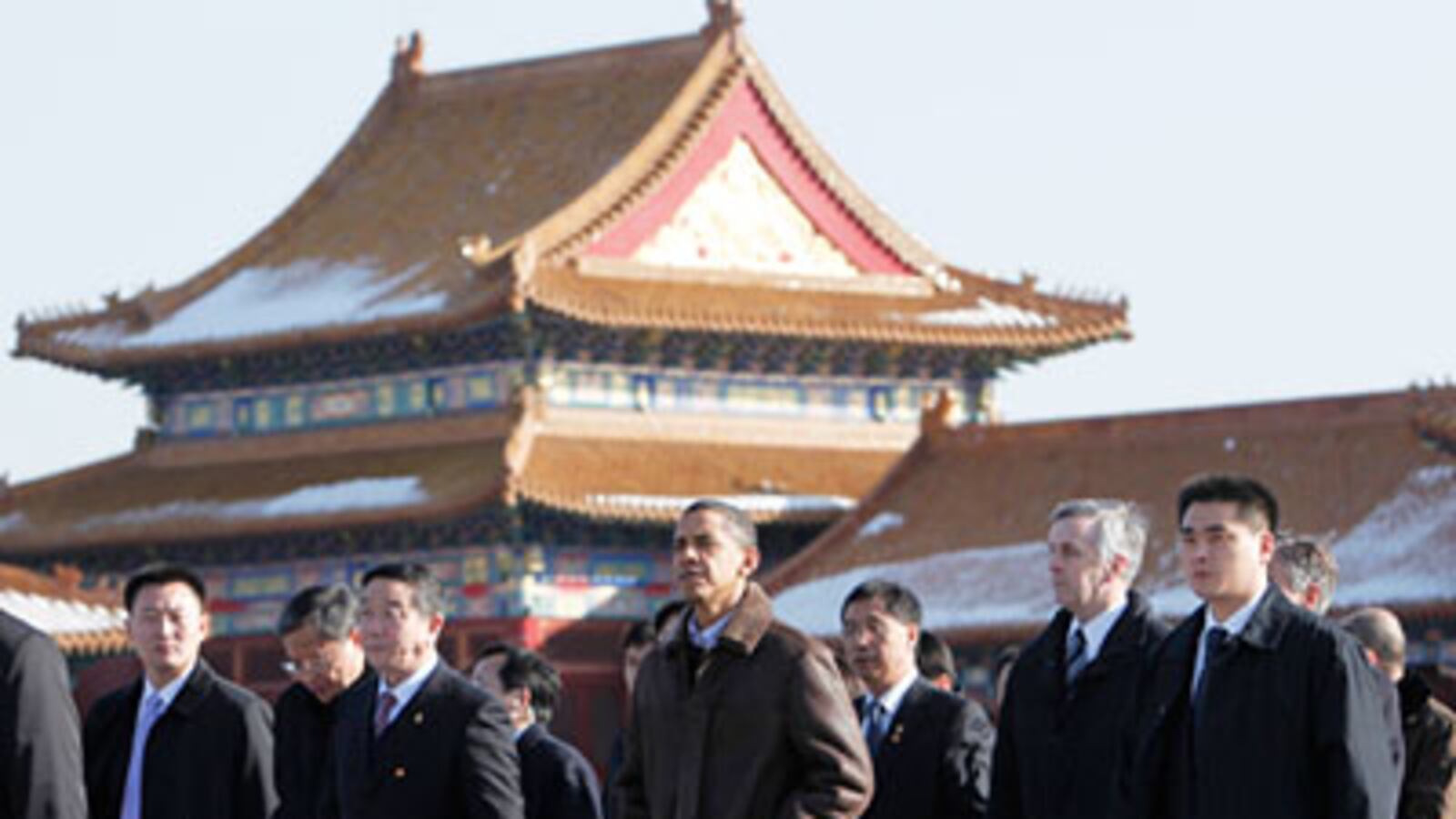To the president’s critics, this week’s White House trip to Asia has largely failed because of excessive deference. Obama bowed to the Japanese emperor, and he metaphorically genuflected to the Chinese leadership by refusing to confront them publicly about human rights.
Yet the president’s biggest foreign-policy setback of the week—by several orders of magnitude—came on the other side of Asia. And its negative impact was worsened by an administration policy that started with public confrontation, not compromise.
Click the Image Below to View Our Gallery of Obama's Asia Trip

That setback came in the Middle East, where Israel ignored once again White House pressure to freeze settlements. Israel also ignored the much more positive message from Secretary of State Hillary Clinton, who recently offered effusive praise of the country’s offer to curb settlement growth.
Both approaches now look foolish, thanks to Israel’s decision to move ahead with plans to expand a Jewish sector of southern Jerusalem, on land captured in the 1967 war.
• Matthew Yglesias: Step Up to the Plate, China • Peter Beinart: China’s Upper Hand At the same time, Palestinian officials are pressing ahead with their own plans to ask the U.N. Security Council to recognize a Palestinian state, without Israel’s approval. That unilateral, and probably doomed, move follows the public threat by Mahmoud Abbas to quit as Palestinian president and quite possibly trigger the collapse of the entire Palestinian Authority.
Once Israel ignored the White House position on settlements, the administration decided the best approach would be direct peace talks, including final-status issues of borders, Jerusalem, and refugees. Instead both sides seem to have decided to resolve some of the final-status issues on their own—either by seizing more land, or seeking international support for statehood.
The approaches by Obama and Hillary Clinton now look foolish, thanks to Israel’s decision to move ahead with plans to expand a Jewish sector of southern Jerusalem, on land captured in the 1967 war.
• PEN ALERT: Free Liu XiaoboMore Daily Beast contributors on Palin’s book tour. Small wonder that the White House issued an unusually heated statement on Tuesday, placing the words in the mouth of the hot-headed press secretary, Robert Gibbs. “We are dismayed at the Jerusalem Planning Committee’s decision to move forward on the approval process for the expansion of Gilo in Jerusalem. At a time when we are working to re-launch negotiations, these actions make it more difficult for our efforts to succeed,” he said. “Neither party should engage in efforts or take actions that could unilaterally pre-empt, or appear to pre-empt, negotiations.”
For the White House—and the traveling press corps—Israel’s actions stepped on a carefully crafted script. The unraveling of the administration’s Middle East strategy is a relatively slow-moving story taking place nowhere near China, Japan or Singapore. For the reporters trailing Obama overseas, it was a chance to cut away from the spoon-fed diplomatic events and cover an escalating conflict.
The sudden intervention of Israel on the agenda did provide a distraction. The coverage of Obama’s tour of China thus far has focused largely on the lack of concrete accomplishments. The two countries did move a small step closer toward setting goals for carbon-emission cuts in advance of the Copenhagen climate talks in December. But China remained hesitant to sign up for sanctions against Iran, Obama shied from tough human-rights talk—at least in public—and there was no mistaking the changed balance of power whenever the subject of currency, loans, and debt arose.
Most have compared Obama’s trip unfavorably to his predecessors, citing President Clinton’s discussion of human rights, and President Bush’s repeated efforts to pressure the Chinese for religious freedom. But neither Clinton nor Bush succeeded in advancing either cause, no matter how high-profile their challenge to Beijing. Obama may have taken a different tack in largely avoiding public criticism of China, but it’s not clear whether he’s coming home any more empty-handed than 42 and 43 did.
The one advance made on Obama’s trip: getting Russian president Dmitry Medvedev to express publicly his impatience with the pace of the talks about Iran’s nuclear program. “In case we fail,” Medvedev explained darkly, “the other options remain on the table in order to move the process in a different direction.”
President Bush long claimed to have a private agreement with his Russian counterpart about the need to halt the Iranian nuclear program. But he rarely, if ever, secured that kind of public support.
Of course, Medvedev could yet pull back from his apparent backing of a united approach. But thus far, the Russian president, of all people, has provided the clear highlight of what has been a rather difficult trip.
Richard Wolffe is Daily Beast columnist and an award-winning journalist, and senior strategist at Public Strategies. He covered the entire length of Barack Obama's presidential campaign for Newsweek magazine. His book, Renegade: The Making of a President, was published by Crown in June.






